 W
WAndrew Craigie (1754-1819) is best known for serving as the first Apothecary General of the Continental Army during the American Revolution. The one-time owner of the Longfellow House–Washington's Headquarters National Historic Site, Craigie developed much of East Cambridge, Massachusetts and was responsible for the construction of the Canal Bridge connecting East Cambridge and Boston, which later became known as the Craigie Bridge and later was rebuilt as the Charles River Dam Bridge, but which is still also referred to as Craigie's Bridge.
 W
WColonel Loammi Baldwin was a noted American engineer, politician, and a soldier in the American Revolutionary War.
 W
WJames Barrett was an American colonel in the Concord, Massachusetts militia during the Battles of Lexington and Concord that began the American Revolutionary War. His farm was the storage site of all the town of Concord's militia gunpowder, weapons and two pairs of prized bronze cannons, according to secret British intelligence.
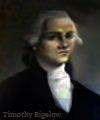 W
WTimothy Bigelow fought as a patriot in the American Revolution.
 W
WJohn Brooks was a doctor, military officer, and politician from Massachusetts. He served as the 11th Governor of Massachusetts from 1816 to 1823, and was one of the last Federalist officials elected in the United States.
 W
WHenry Burbeck was a long-time artillery officer in the United States Army who served from the early days of the American Revolutionary War through the War of 1812. He served as Chief of Engineers from 1798 to 1802.
 W
WMatthew Clarkson was a colonial soldier and politician. Clarkson Street in Greenwich Village and the town of Clarkson in Western New York were both named after him.
 W
WDavid Cobb was a Massachusetts physician, military officer, jurist, and politician who served as a U.S. Congressman for Massachusetts's at-large congressional seat.
 W
WThomas Humphrey Cushing was an officer in the Continental Army, and later the United States Army, and finally became a collector of customs for the port of New London, Connecticut.
 W
WLuke Day Jr. was an American military officer, revolutionary, and farmer, most familiar for his leadership role in Shays' Rebellion, for which he was convicted of high treason and sentenced to death, before being pardoned by Governor John Hancock. He was referred to as the "Master Spirit" of the insurrection, and was only passed over as overall leader in favor of Daniel Shays due to the perception of overzealousness on his part, by his men. As a lieutenant, and then a captain, he served for eight years and participated in many key battles of the American Revolutionary War, including the Siege of Boston, Quebec Expedition, Battles of Saratoga, Cherry Valley massacre, Sullivan Expedition and Siege of Yorktown. After the war, he joined the prestigious Society of the Cincinnati, which included the likes of George Washington and Alexander Hamilton.
 W
WThomas Edwards was the third Judge Advocate General of the United States Army.
 W
WWilliam Eustis was an early American physician, politician, and statesman from Massachusetts. Trained in medicine, he served as a military surgeon during the American Revolutionary War, notably at the Battle of Bunker Hill. He resumed medical practice after the war, but soon entered politics.
 W
WJohn Glover was an American fisherman, merchant, and military leader from Marblehead, Massachusetts, who served as a brigadier general in the Continental Army during the American Revolutionary War.
 W
WWilliam Heath was an American farmer, soldier, and political leader from Massachusetts who served as a major general in the Continental Army during the American Revolutionary War.
 W
WHenry Jackson was a Continental Army officer from Boston, Massachusetts during the American Revolutionary War. For most of the war he was colonel of Jackson's Additional Continental Regiment, which was redesignated the 16th Massachusetts in 1780. He commanded the last regiment of the Continental Army, the 1st American, which was disbanded in 1784. Jackson was a lifelong friend of Henry Knox, another Continental Army officer, whose business affairs he was also heavily involved in.
 W
WHenry Knox was a senior general of the Continental Army and later the United States Army. He directed the artillery in the successful war for independence. He was close to George Washington, who appointed him first United States Secretary of War from 1789 to 1794.
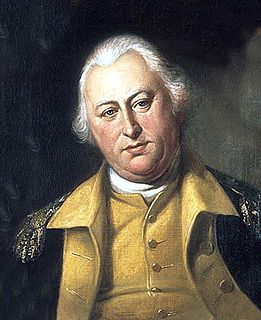 W
WBenjamin Lincoln was an American army officer. He served as a major general in the Continental Army during the American Revolutionary War. Lincoln was involved in three major surrenders during the war: his participation in the Battles of Saratoga contributed to John Burgoyne's surrender of a British army, he oversaw the largest American surrender of the war at the 1780 Siege of Charleston, and, as George Washington's second in command, he formally accepted the British surrender at Yorktown.
 W
WThomas Melvill or Thomas Melville was a merchant, member of the Sons of Liberty, participant in the Boston Tea Party, a major in the American Revolutionary War, a longtime fireman in the Boston Fire Department, state legislator, and paternal grandfather of writer Herman Melville.
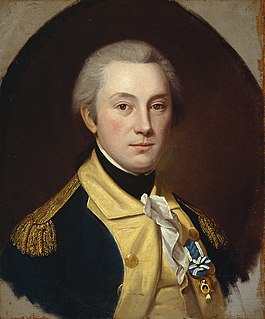 W
WWilliam North was an American soldier and politician.
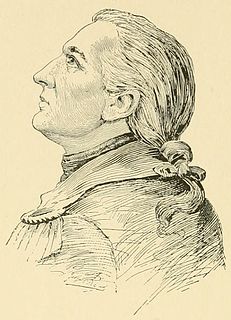 W
WJohn Paterson was a major general in the Continental Army during the American Revolution, and a U.S. Congressman from New York.
 W
WTimothy Pickering was the third United States Secretary of State under Presidents George Washington and John Adams. He also represented Massachusetts in both houses of Congress as a member of the Federalist Party. In 1795, he was elected a member of the American Philosophical Society.
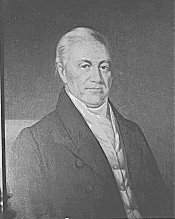 W
WBenjamin Pierce was a colonial soldier in the American Revolutionary War and an American Democratic-Republican politician. He was the father of Franklin Pierce, the 14th president of the United States. He served as Governor of New Hampshire from 1827 to 1828 and from 1829 to 1830.
 W
WWilliam Prescott was an American colonel in the Revolutionary War who commanded the patriot forces in the Battle of Bunker Hill. Prescott is known for his order to his soldiers, "Do not fire until you see the whites of their eyes", such that the rebel troops may shoot at the enemy at shorter ranges, and therefore more accurately and lethally, and so conserve their limited stocks of ammunition. It is debated whether Prescott or someone earlier coined this memorable saying.
 W
WRufus Putnam was a colonial military officer during the French and Indian War, and a general in the Continental Army during the American Revolutionary War. As an organizer of the Ohio Company, he was instrumental in the initial settling of the Northwest Territory in present-day Ohio following the war.
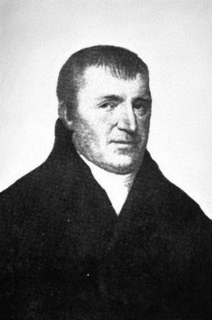 W
WJedediah Sanger was the founder of the town of New Hartford, New York, United States. He was a native of Sherborn, Massachusetts, and the ninth child of Richard and Deborah Sanger, a prominent colonial New England family. During the Revolutionary War he attained the rank of 1st Lieutenant having fought in the Battles of Lexington and Concord, the Battle of Bunker Hill, the Siege of Boston (1776), and during the New York Campaign.
 W
WWinthrop Sargent was a United States patriot, politician, and writer; and a member of the Federalist party.
 W
WTheodore Sedgwick was an American attorney, politician, and jurist who served in elected state government and as a delegate to the Continental Congress, a US representative, and a senator from Massachusetts. He served as the fourth Speaker of the United States House of Representatives. He was appointed to the Massachusetts Supreme Judicial Court in 1802 and served there for the rest of his life.
 W
WWilliam Shepard was a United States Representative from Massachusetts (1797–1802), and a military officer in the Continental Army during the American Revolutionary War. As a state militia leader he protected the Springfield Armory during Shays' Rebellion, firing cannon into the force of Daniel Shays and compelling them to disperse. He was also served in town and state government and was a member of the Massachusetts Governor's Council.
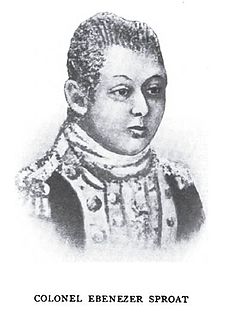 W
WEbenezer Sproat, surname also spelled Sprout, was an officer of the Continental Army during the American Revolutionary War, a pioneer to the Ohio Country, and one of the founders of Marietta, Ohio, the first permanent American settlement in the Northwest Territory. He served throughout the entire American war of independence, from April 1775 through November 1783, achieving the rank of colonel. After the war, he was a pioneer and surveyor in the Northwest Territory, and became a leader of the militia at Marietta during the Northwest Indian War. He was the first sheriff in the Northwest Territory and Ohio, serving fourteen years as sheriff of Washington County, the oldest county in Ohio.
 W
WJohn Thomas was an American doctor and soldier from Massachusetts who became a major general in the Continental Army. He was a leader during the siege of Boston. Thomas briefly commanded the withdrawal from Canada after the unsuccessful invasion by the Continental Army. He died from smallpox during the retreat.
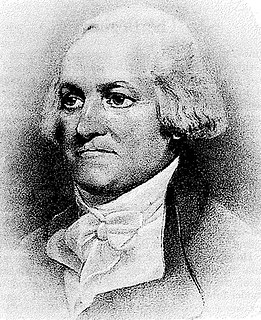 W
WWilliam Tudor was a wealthy lawyer and leading citizen of Boston. His eldest son William Tudor (1779-1830) became a leading literary figure in Boston. Another son, Frederic Tudor, founded the Tudor Ice Company and became Boston's "Ice King", shipping ice to the tropics from many local sources of fresh water including Walden Pond, Fresh Pond, and Spy Pond in Arlington, Massachusetts.
 W
WAnselm Tupper (1763–1808) was an officer of the Continental Army during the American Revolutionary War, a pioneer to the Ohio Country, and one of the founders of Marietta, Ohio, the first permanent American settlement in the Northwest Territory. The eldest son of Benjamin Tupper, Anselm enlisted in the fight for independence during 1775, while only eleven years old, achieving the rank of lieutenant before his seventeenth birthday. After the war, he was a pioneer and surveyor in the Northwest Territory, and became major of the militia at Marietta during the Northwest Indian War. Tupper was the first school teacher at Marietta, and was a classical scholar and poet. He was unmarried, and was known as a favorite in society.
 W
WBenjamin Tupper was a soldier in the French and Indian War, and an officer of the Continental Army during the American Revolutionary War, achieving the rank of brevet brigadier general. Subsequently, he served as a Massachusetts legislator, and he assisted Gen. William Shepard in stopping Shays' Rebellion. Benjamin Tupper was a co-founder of the Ohio Company of Associates, and was a pioneer to the Ohio Country, involved in establishing Marietta, Ohio as the first permanent settlement in the Northwest Territory.
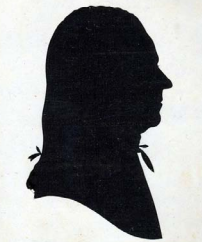 W
WPeleg Wadsworth was an American Patriot officer during the American Revolutionary War and a Congressman from Massachusetts representing the District of Maine. He was also grandfather of noted American poet Henry Wadsworth Longfellow.
 W
WArtemas Ward was an American major general in the American Revolutionary War and a Congressman from Massachusetts. He was considered an effective political leader, President John Adams describing him as "universally esteemed, beloved and confided in by his army and his country."
 W
WJoseph Warren was an American physician who played a leading role in Patriot organizations in Boston during the early days of the American Revolution, eventually serving as President of the revolutionary Massachusetts Provincial Congress. Warren enlisted Paul Revere and William Dawes on April 18, 1775, to leave Boston and spread the alarm that the British garrison in Boston was setting out to raid the town of Concord and arrest rebel leaders John Hancock and Samuel Adams. Warren participated in the Battles of Lexington and Concord the following day, which are commonly considered to be the opening engagements of the American Revolutionary War.